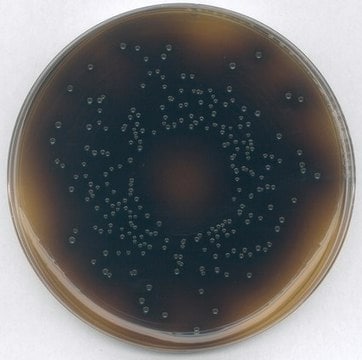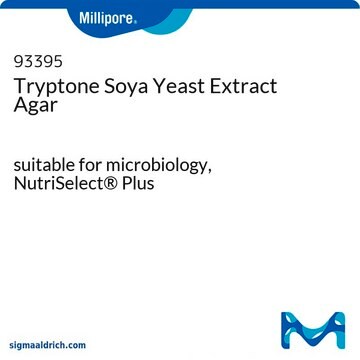1.10398
GranuCult® FRASER broth (base)
pkg of 500 g, according to ISO 11290, APHA, selective for Listeria spp.
Synonym(s):
Listeria Selective Enrichment Broth, Full FRASER broth
About This Item
Recommended Products
Agency
APHA
according to ISO 11290
Quality Level
sterility
non-sterile
form
granular
packaging
pkg of 500 g
manufacturer/tradename
GranuCult® prime
storage condition
protect from light (both UV and Sunlight)
technique(s)
microbiological culture: suitable
pH
7.0-7.4 (25 °C, 57.4 g/L in H2O)
solubility
57.4 g/L
application(s)
food and beverages
microbiology
pathogen testing
storage temp.
15-25°C
suitability
selective for Listeria spp.
General description
Application
Linkage
Analysis Note
Appearance (color): yellowish-brown
pH-value (25 °C): 7.0 - 7.4
Growth promotion test in accordance with the current version of DIN EN ISO 11133.
Mixed inoculum of Listeria, E.coli and E.faecalis
Additionaly monoculture of E.coli and E.faecalis
Confirmation on ALOA®-Medium resp. Tryptic soy agar
Inoculum on reference medium (Listeria monocytogenes ATCC 13932 (WDCM 00021)): ≤ 100
Inoculum on reference medium (Listeria monocytogenes ATCC 35152 (WDCM 00109)): ≤ 100
Inoculum on reference medium (Escherichia coli ATCC 25922 (WDCM 00013)): ≥ 1000
Inoculum on reference medium (Escherichia coli ATCC 8739 (WDCM 00012)): ≥ 1000
Inoculum on reference medium (Enterococcus faecalis ATCC 19433 (WDCM 00009)): ≥ 1000
Inoculum on reference medium (Enterococcus faecalis ATCC 29212 (WDCM 00087)): ≥ 1000
Blacking (Listeria monocytogenes ATCC 13932 (WDCM 00021)): +
Blacking (Listeria monocytogenes ATCC 35152 (WDCM 00109)): +
Blacking (Escherichia coli ATCC 25922 (WDCM 00013)): -
Blacking (Escherichia coli ATCC 8739 (WDCM 00012)): -
Blacking (Enterococcus faecalis ATCC 19433 (WDCM 00009)): -
Blacking (Enterococcus faecalis ATCC 29212 (WDCM 00087)): -
Growth on ALOA medium (Listeria monocytogenes ATCC 13932 (WDCM 00021)): >10 colonies
Growth on ALOA medium(Listeria monocytogenes ATCC 35152 (WDCM 00109)): >10 colonies
Colonies (Listeria monocytogenes ATCC 13932 (WDCM 00021)): blue green colonies with opaque halo
Colonies(Listeria monocytogenes ATCC 35152 (WDCM 00109)): blue green colonies with opaque halo
Growth on Tryptic soy agar (Escherichia coli ATCC 25922 (WDCM 00013)): total inhibition
Growth on Tryptic soy agar (Escherichia coli ATCC 8739 (WDCM 00012)): total inhibition
Growth on Tryptic soy agar (Enterococcus faecalis ATCC 29212 (WDCM 00087)): <100 colonien
Growth on Tryptic soy agar (Enterococcus faecalis ATCC 19433 (WDCM 00009)): <100 colonies
Incubation:
Half-Fraser Broth: 24 ± 2 hours at 30 ± 1°C
Fraser Broth: 48 ± 2 hours at 37 ± 1°C
Confirmation on ALOA medium: 44 ± 4 hours at 37 ±1°C
Confirmation on Tryptic soy agar: 24 ± 3 hours at 37 ± 1°C
Footnote
The designations basic, plus, or prime are added to indicate the quality control level, from basic quality control to standard QC plus to prime for full regulatory compliance.
Legal Information
Storage Class Code
11 - Combustible Solids
WGK
WGK 3
Certificates of Analysis (COA)
Search for Certificates of Analysis (COA) by entering the products Lot/Batch Number. Lot and Batch Numbers can be found on a product’s label following the words ‘Lot’ or ‘Batch’.
Already Own This Product?
Find documentation for the products that you have recently purchased in the Document Library.
Customers Also Viewed
Articles
Microbial culture media is available in both powdered and granulated forms. This article compares the characteristics of each culture media format with regards to safety, handling and convenience.
Microbial culture media is available in both powdered and granulated forms. This article compares the characteristics of each culture media format with regards to safety, handling and convenience.
Microbial culture media is available in both powdered and granulated forms. This article compares the characteristics of each culture media format with regards to safety, handling and convenience.
Microbial culture media is available in both powdered and granulated forms. This article compares the characteristics of each culture media format with regards to safety, handling and convenience.
Protocols
Listeria is a public health concern, affecting elderly, pregnant, newborns, and immunocompromised individuals.
Listeria is a public health concern, affecting elderly, pregnant, newborns, and immunocompromised individuals.
Listeria is a public health concern, affecting elderly, pregnant, newborns, and immunocompromised individuals.
Listeria is a public health concern, affecting elderly, pregnant, newborns, and immunocompromised individuals.
Our team of scientists has experience in all areas of research including Life Science, Material Science, Chemical Synthesis, Chromatography, Analytical and many others.
Contact Technical Service














